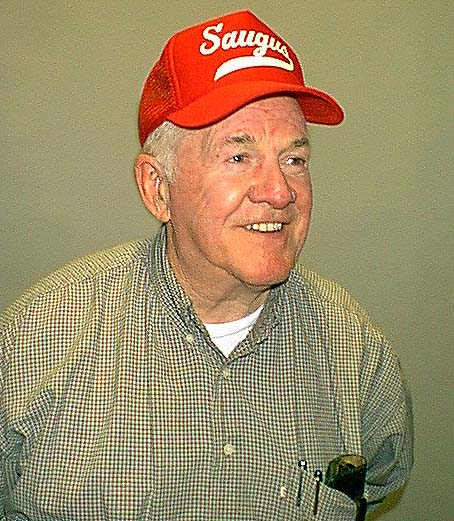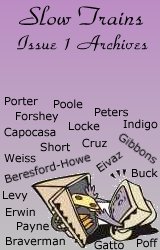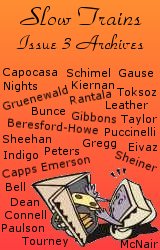
The Bill Collector
by Tom Sheehan
It was to be an eventful day, that hot August Saturday in 1936 in West Roxbury. Furniture was coming. The front room of our third floor apartment was dance hall bare, as my mother had said many times, and it had been that way for months, a raw corridor in itself. Every so often I’d catch her standing at its door or in the middle of that pound of silence (her favorite reference to it), looking as if one of her children were missing. Tall, strong across shoulder, dark haired and dark eyed, lovely white complexion she said was a toast to Cork’s clear air, where she was born, she was not one for using many gestures to express herself. Only if you stared hard, would you see a firmness tighten on her jaw, set her lips; mind made up, deed to be done.
Impervious to a host of things that bogged down or disrupted less a soul, especially in those difficult times (my father working but partial hours in a factory which in those times had not yet got a “voice”, coming home tired and his feet hurting, three children always reaching for mostly what wasn’t there), she reacted indignantly and impetuously to her own high-heeled steps across the bare floor. That too-silent room, that useless cubicle, was full of echoes of all kinds, needing only to be triggered, and it was her heel clicks coming most alive of all, each one unique, a message being sent one letter at a time.
She would stop part way across that passage on her way to peer out the front window, look over her shoulder, and set her chin, a singular muscle tensing beneath the skin of her jaw. One would think she was being followed and had vowed to lose herself in silence, my tall, lovely, warm, obstinate mother,usually without gestures, featured in a black and white movie, suddenly silent without her footsteps.
Late at night there had been arguments about furniture, oh arguments indeed, the very need of it in the first place, an extravagance, its less than full time utility, we don’t live in a barn, the almost inexhaustible supply of hand-made doilies my grandmother had crocheted for what seemed a hundred years gathering only the dust of history in old hat boxes. She rarely raised her voice, but the smooth and rhythmic engine of her purring came through the other five rooms as if she were keeping her speed steadily at five miles an hour. To a word she was intractable, and after much argument and setting stands a four-star general would have been proud of, and subsequent searches across a wide boundary of opportunities, had found one Simon Westman. He was a man who was willing to arrange delivery of five pieces upon the promise of $2.15 being placed in his hands each Saturday morning thereafter, until paid off could be noted in his little black book.
So Simon came that hot August Saturday morning in 1936, and Simon said, loud enough for the neighborhood to get acquainted with the business terror of his harsh voice, a crier reaching up and past his own tier, laddering himself no less, and forever the salesman, “Up with it, boys, to the third floor, and don’t hurt a curl of its luxury!” Upward he pointed, Hannibal at the foot of the Alps, ready for the snowy terrors and what lay beyond. Then, hands on his hips, head wagging like the lead bitch at a dog show, his voice magisterial, dictatorial, more European than other possibilities, vestiges of Carthage and Waterloo locked into it, he shaped himself up for our neighborhood gawkers, a grand host of window hanger-outers, lace curtain parters with faces held back, who deep in their souls envied my mother’s delivery. Their silence was akin to applause, almost luxurious in those harsh Thirties hanging themselves over us. They had been there in such grip forever, every last one of them, and were still trapped in that time and in that mind set.
Simon had stepped out of his dark green Graham, pulled up tightly behind the canvas covered truck, all 5’ 4” of him, wide-brimmed felt hat, stiff collar, dark suit appearing to have faint orange stripes still in residence, goggle- or pop-eyed so that his stare almost hurt me.
Years later that vision said he reminded me of a poem Shelley might have written, Exophthalmos, or graffiti that some punning spelunker might have scribed on a dark wall, cavernous sinus thrombosis. Pain sat on his puffy red cheeks as though six decades earlier an exuberant midwife had squeezed it permanently into place.
Stepping down from the running board, holding tightly to a door handle of the dark Graham for support, he could have been a valet exiting a Pullman belonging to the Czar, or he could have been the Czar himself.
His compatriots were a diverse pair, oddest imaginable book ends in freighting. One, the larger of the two, was a bloated giant; he’d be, I thought, the mucker as anyone would have said, a miner, a lifter, a hunkin’ stevie from the docks of Charlestown, his back thick enough for toting an oaken ice box, and would most likely be voiceless, a mute acceptor of direction, of order, a pure piece worker whose every dollar earned, you could bet, would be quaffed off before nightfall.
The other was a coin of the obverse side, company clerk-ish (as in military), small, thin, clean shaven, given to hand pointing, head nodding, minor grunts, a peacock of the first order. A bowler sat his head cocked at an angle, a precipitous angle, a daring angle, with a scrawny green feather etched to it as wayward and worn as an afterthought. His grin would come back to me years later as Barry Fitzgerald plotted his moves in The Quiet Man, his lips smacking at taste, at connivance.
The hunkie lifted, the clerk pointed, Simon watched, his arms folded across his chest, and the puffy new sofa, two large red-and-blue easy chairs, a coffee table and an end table made their way up three flights to our bare dance hall. My mother, an absolute magician who could put a supper meal on the table from an empty larder, produced a dark red rug from her bedroom closet, a rug none of us had seen before, and Asian for sure. The age old, elegant and delicate doilies came out of their long darkness.
Her room shone; she shone; and Simon parted company with the dire challenge, “I’ll be back next Saturday morning for the first payment.”
Nodding at his crew, he said, “That’s it, boys. Off we go.”
The puffy eyes, the orange-striped suit, the corporal-ish man went out the door and down the stairs.
For the best part of a year Simon came on Saturday mornings, the Graham his advance calling card as it rolled into the Square below us. My mother would sigh almost inaudibly, set her chin in her way, and reach into an oatmeal box where she kept her change. Never once did she pay Simon his $2.15 with anything but coin, never a bill changing hands. If there was a message to her accounting, it never found Simon, never fazed him, and the creditable entry would be posted in his little book which we all dreamed about reading someday. For a while I might even have been obsessed with whatever its contents revealed; it was almost an adversary.
Simon was a challenge, though, and took noting. He never sweat, never cursed a late entry, never came up the three flights without pausing a half dozen times on the stairs and lower levels. He’d smile at my mother, look in at the front room, nod his appreciation, accept her coin, make the entry in his little book, all the while his gray-white eyeballs protruding out of their sockets. They’d have made drill sergeants uncomfortable.
Once, in a cold and extremely raw January, he did not appear for three weeks and I suggested that he might have died and our payments would be done. My mother shook her head lightly; I wasn’t sure if she were saying, “It’s not in our luck”, or “Don’t bring pain on anybody.” But, eventually, there was the Graham and Simon and the pauses on the stairs of his mountain climbing and the coin exchange and the book entry, as if nothing ever in life were going to change.
Simon, thus, was a certainty in our life, a piece of clock work, and the year moved on in its way, languid, hot and then cool, dry and then wet, seasons unfolding and fulfilling their prophecies and predictions, time tumbling all around me (my pants one day going from knickers to long in one sweet afternoon I’ll remember forever), and Simon came and Simon said and Simon went, and then, miraculously, a shift came, subtilely, slowly, surely, in the way I looked at him, how I felt about him.
Most likely that may be traced to what my mother said one day when I stood quickly at the kitchen window at the sight of the Graham coming into the square like a ship hitting our small island, to take our stores away. Perhaps dislike or distaste or discomfort rode freely on my face.
“Be careful how you remember Simon.” Her voice was low, carrying no inflection, no tone to be deciphered. She was, acutely, a judge at warning, at guidance.
I began to look at him in different lights, eventually as a survivor, a little man who kept at his practice, who plied his way and his wares, who climbed slowly to face my mother each Saturday, not an easy task in itself, without many failures, a man who did not sweat, who was never wrinkled, who kept his car immaculate, who never looked at his watch. The time came when I did not notice his eyes, forgot their awful prominence, did not pay them any mind. He survived because he was constant, and I began to appreciate that. Survival, and much of its lessons, had been thrown at my feet a few years earlier, before we had moved from cluttered Charlestown, at the very beginning of Bunker Hill Avenue adjacent to Chelsea Street and the Navy Yard where my father spent his last days in the Marine Corps. As a first grader and the son of Charlestown’s most rugged Marine sergeant, I was the choice target of the neighborhood bully, a seventeen-year older who knocked twenty-five pound bags of anthracite pea coal off my shoulder that I would end up retrieving in a box while on my hands and knees (at $.26 a bag it was precious cargo), who would grab the back pockets of my corduroy pants and yank them apart so that the rear seam would be opened wide to my draws (much to my shame), who would smash returnable two cent bottles from my hands while on the way to cash them in at Abie’s Market. My father, when advised, said he would never chase him, would never disgrace the uniform as he returned from duty each day, but promised that he would crush him if he ever turned a corner and found him in his grasp.
He also said I had every right to use a brick or bat or length of pipe to defend myself, and finished off by saying, “You have more than an ounce of brain in your head!” It was somehow camouflaged, like a challenge coming as an aside.
Daily then from the kitchen stove, in the cold water flat on the second floor of a four-decker, I would take the ashes down to the cellar and douse the straggling embers. That was my task and routine, but I changed at my father’s hidden challenge, bringing the ashes, wet and heavier, back up to the second floor and dumping them in a trash barrel. I did that for four days, filched half a dozen rolls of adhesive tape from the market, taped the cover on, threw stones at the bully until he chased me up the stairs, at the top of the stairs pushed that heavy barrel down the steps to meet him.
To this day I can see his hands out in front of him in one final defensive gesture, his eyes as large as mother’s unused and best plates (the blue ones on the top shelf), the non-bully’s scream beginning in his throat, the barrel bouncing downhill crazy to its appointed round. When the police came he told them he had been helping some kid carry down a barrel and it had slipped, breaking his leg. He never looked at me again, even crossed the street coming towards me once in a while, that admission all about him saying to everybody in Charlestown that I was a survivor.
Simon and I then had something in common, and my mother had linked the two of us. It was like accepting, grudgingly, the new kid in class who really wasn’t a bad kid after all. And that moment of revelation and acceptance passed as quick as a shot. One day there’s Simon, and the next Saturday there’s a lanky, bony, thin-faced, tightly-suited replacement with Simon’s book in one hand and the other hand out for his $2.15 plus $.10 for any late payment in the future. My mother lifted her eyebrow, the left one, the most expressive one, at that dictum. Simon had died of a heart attack and here was his nephew taking over his rounds.
Into my young life serious change had been incorporated.
Two weeks later, after pounding on our apartment door, making all kinds of noises down in his throat as though he were gargling with acid, the long, lanky, tight-suited collector of sorts introduced his foot between the door and the stout jamb when my mother had said she had no money for him that day.
He yelled, without any trace of accent, “I know you’ve got money. Simon said you always paid him and you’re going to pay me. I’m not coming around this hole for nothing, you can bet on that! This whole place smells to high heaven, here and every apartment in this whole stretch of blocks! Now give me my money!”
On the front porch, looking down over the peaceful square, no help anywhere in sight, my survival training kicked into high gear. I began to tug feverishly at each and every baluster of the porch railing looking for a loose weapon, my hands stiff and hard and pulsing with righteousness. None came free at such tugging. My mother had begun screaming for him to leave, obviously pushing desperately at the other side of the door, holding the fort high on the third floor. I took one more look down to the street before I knew I’d have to catapult weaponless onto his back in the next few seconds.
Suddenly, below me at street level, squat as a beetle, black canvas top beginning to shred but still showing remnants of its original luster, against the curb came my uncle Owen’s long-hooded Packard, and my father stepping out of it.
“Dad!” I yelled, putting panic in my voice with my most calculated manner, setting off the alarm of alarms, “Some guy’s got his foot in the door and mom’s crying.”
You know what irony is, don’t you, full-fledged irony? Well, I saw it unfold right before my eyes, irony and the lesson of sweetest justice. Lanky’s foot was still in the door and my mother was still pushing on the other side, and he heard the roars of a lion three floors below him and those fearful and heavy feet on the steps, and the pounding and the roaring ascending as if from the pit of hell itself. And he can’t get his foot out from that improvident vise because my strong and warrior and broad-shouldered and home-protecting mother holds firm to her station.
Oh, he struggled then, did Lanky, shoving on the door, kicking with his other foot, banging the oak footer, tossing his head this way and that like a stallion under harness, his shoulders shaking and convulsive and the threads of his suit threatening to burst, his throat finally cleared of all debris. “Let go, damn you, you absolute bitch you! Let go!” and the lion is closer and the sounds are hell themselves and suddenly, in a movie, in a close-up film, there’s this madman rising from the bowels of the earth and a final roar exits from the heart of Vesuvius.
“Let go, Helen!” yelled my father, his hands reaching steeled and awful as talons, his eyes full of what I’d never seen once in my life, and a wild energy pulsing about him more terrible than electricity. Like a snap, quick as thought, down three flights of stairs went Lanky, pummeled every step of the way, pillar to post to baluster to the final newel on the ground floor, bone and flesh touching every tread, a ball, a toy, a stick to be kicked on a wayward walk.
The cop on the beat rushed over and stepped aside as my father ushered Lanky to his car, propped him behind the wheel, put his finger under his nose and said, low and mean, more of Vesuvius rising again, “Don’t come back!” He turned the ignition key, slammed the heel of his hand on the floor starter tucked against the seat, and pointed out of town.
Lanky never came back, and four years ago, when my mother was within a day of her death, she placed in my hands my father’s metal box whose contents I had never seen. In it I found his Marine Corps discharge creased together in gray-yellow folds, a Corps commendation in the neatest script you can imagine, two Nicaraguan Service Medals circa Chesty Puller, a post card from Captain James Devereaux (later at Wake Island) that said, “Jim, do you remember the night Atlanta got treed?”, a note from the first grade teacher in Charlestown, Miss Finn, begging my mother that we not move away until she had taught all the Sheehans, and Simon Westman’s little book, Lanky’s loss no doubt, with nine blank spaces yet to be marked for coin.

 Ten years retired, Tom Sheehan operates with his partner, Larry Bucaria, Newwriters.com, helping writers find landing space in the publishing world. This story is from a manuscript, A Collection of Friends, which sits in his computer along with nine novel manuscripts. 500 of his poems have appeared in magazines; he's published 3 books of poetry; and is co-editor of a 452 page book A Gathering of Memories, Saugus 1900-2000, a nostalgic and historical view of his hometown, Saugus, MA, just north of Boston. Gathering (for which they borrowed $60K for printing and paid off four weeks after receipt of books) has been claimed as a "masterpiece," "must reading for all," "a book that breathes quality." It sold all 2000 copies printed within five months of release and has almost sold out a new printing. A mystery novel, Vigilantes East, is near print release, and another is being serialized in Paris on 3amMagazine.com. He is a nominee for both Pushcart Prize XXVII and the 2001 Silver Rose Award for Excellence of the Short Story.
Ten years retired, Tom Sheehan operates with his partner, Larry Bucaria, Newwriters.com, helping writers find landing space in the publishing world. This story is from a manuscript, A Collection of Friends, which sits in his computer along with nine novel manuscripts. 500 of his poems have appeared in magazines; he's published 3 books of poetry; and is co-editor of a 452 page book A Gathering of Memories, Saugus 1900-2000, a nostalgic and historical view of his hometown, Saugus, MA, just north of Boston. Gathering (for which they borrowed $60K for printing and paid off four weeks after receipt of books) has been claimed as a "masterpiece," "must reading for all," "a book that breathes quality." It sold all 2000 copies printed within five months of release and has almost sold out a new printing. A mystery novel, Vigilantes East, is near print release, and another is being serialized in Paris on 3amMagazine.com. He is a nominee for both Pushcart Prize XXVII and the 2001 Silver Rose Award for Excellence of the Short Story.





